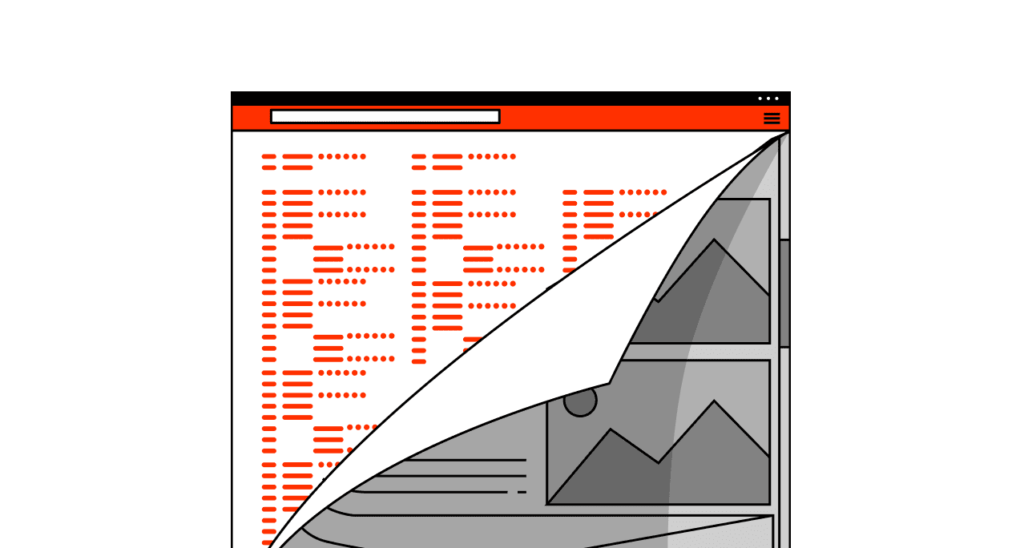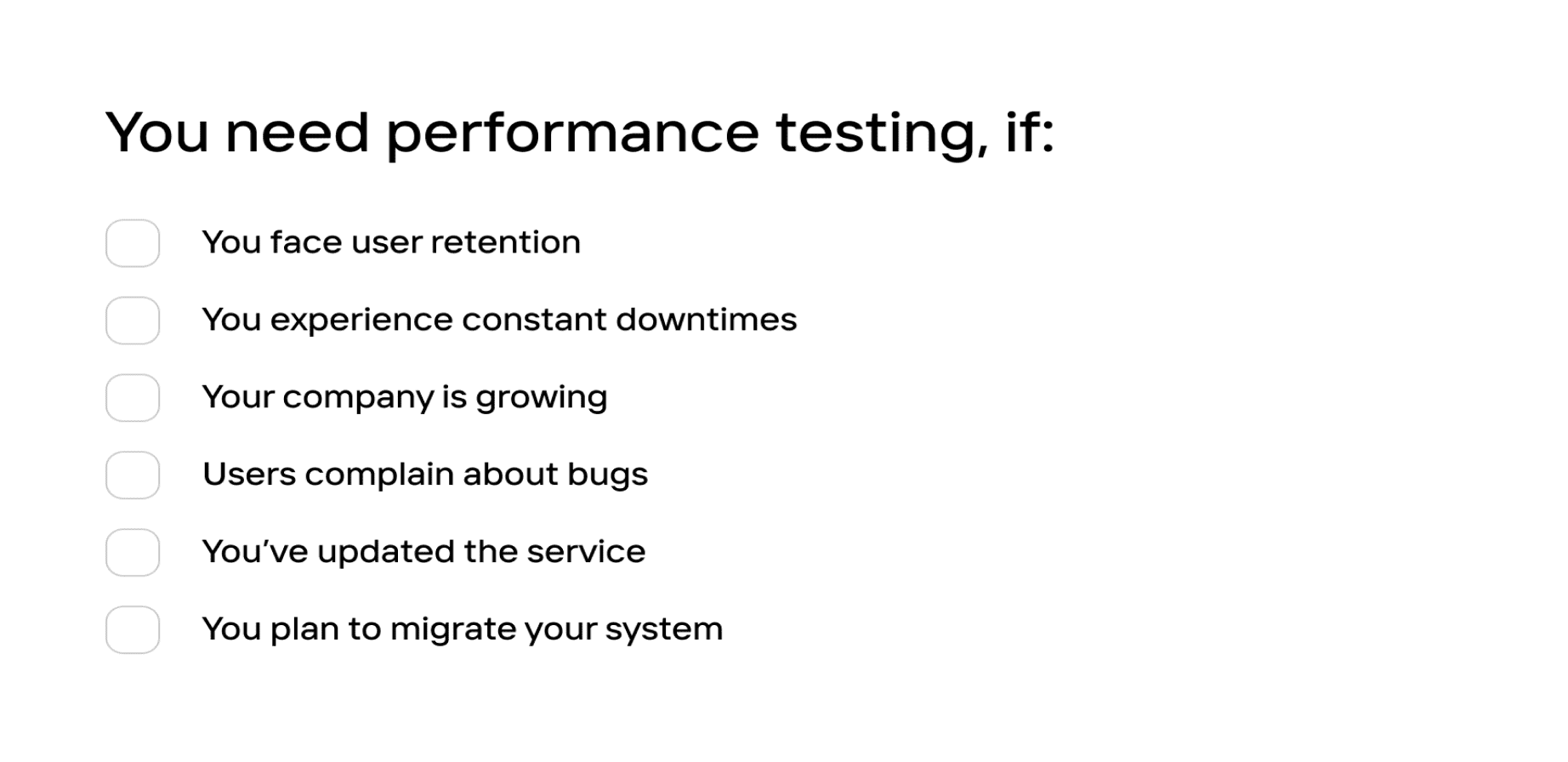The core of efficient performance testing is an experienced, certified and well-structured team of professionals, who have already worked in similar projects, and learned all the peculiarities of QA testing types, and protocols.
If consciously chosen, they can evaluate a product, test its behavior under a load, check its response time, etc., and thus, empower it. Meanwhile, these are the basic benefits of a performance testing team. In this post, we’ll cover more of them, define the role of each QA team member, and outline the ways to enhance their efficiency.
Performance Testing Team Value
To grow, any digital project requires performance testing. This process ensures that a software system is reliable, efficient, and scalable enough to meet both the business’s and users’ needs. To achieve such results, a company needs a well-structured performance testing team.
Prevents Service Disruptions
Timely and regular performance testing by a certified team can identify potential performance issues before they become costly problems, saving time and resources. Also, it helps to prevent high load-caused losses like Amazon faced in 2021, losing about $34 million in an hour.
Enhances Customer Satisfaction
Performance testing helps ensure that applications respond quickly, directly contributing to a positive user experience, increasing engagement, and boosting interactivity. Considering that 84% of customers are ready to pay more for better experiences, this is a vital aspect.
Optimizes Scalability
The team assesses how well an application can scale with increased load, helping organizations plan for growth and manage resources efficiently.
Optimizes Costs
By identifying performance bottlenecks and issues early, the QA team reduces the cost of fixing issues in later development stages and thus, lets the company optimize its infrastructure investments.
Meanwhile, if a business has an exact scaling plan and conducts regular performance testing, costs are significantly reduced.
Roles and Responsibilities
As a rule, performance testing is conducted by a QA (Quality Assurance) which detects hidden errors before the official launch of a product and thus, minimizing potential losses and software failure risks. As a rule, this team has a hierarchical organizational structure with clearly defined roles and responsibilities.
QA Lead
Skilled, experienced, and diplomatic, the QA Lead drives the process of performance testing. Their responsibilities include planning with clear steps identification, decisions on methodologies and procedures, ideation, reviews, feedback, inter and intra-department communication, scheduling, and budgeting. Also, this person motivates other team members and ensures discipline.
Test Lead
With an impressive test data management experience and an in-depth understanding of business needs, test leads assist the QA leads with planning and supervision. Meanwhile, their other responsibilities include the development of the test strategy and a plan, test team management, scenarios and cases definition, test execution control, and evaluation.
Test Engineers
The role of a test engineer is to ensure and enhance the overall test execution. Either in product teams or in QA departments, they build a testing framework and environments, select testing parameters, apply them to thoroughly check processes, document the results, conduct data analysis, and propose improvements. Performance testers ensure the design, implementation, and support of QA systems and strategies, granting systems the required capacity and scalability.
Performance Test Environment Coordinator
This role is responsible for managing and maintaining the test environment, ensuring it accurately reflects the production environment, and providing necessary support to the performance testing team during testing activities.
Performance Testing Automation Specialists
They set up the data preparation for tests and the launch from the CI/CD pipeline. Also, they automate the results analysis.
Performance Testing Experts
Performance testing and automation ambassadors implement performance testing and load testing automation practices into product teams where load testing is not yet carried out.
Capacity Managers
Capacity manager is responsible for long-term capacity planning, utilizing the results of load testing, as well as collecting and considering business plans for cost-effective infrastructure planning.
Tips to Enhance Performance Testing Team
The efficiency and profits of a platform are powered by strong performance testing. So, to maximize the positive outcomes, a strong team is a must. To make the most of it, explore the following tips.
Hire Consciously
When hiring, outline the structure of a team, plan its budget, and define its pains. To describe positions and performance testing skills required, you should clearly understand what testing types you will need in the future.
Next, be eager to devote enough time to search for skillful, experienced, and available professionals. They tend to be sought-after. Just don’t hire the first specialist you see: if you agree on something, you may be ready to pay a decent salary. So, conduct detailed scoring, require confirmed cases, and, importantly, ask a relevant talent to bring their professional network to your business. It can save your time and grant better, more polished results.
Pay Enough Attention to the Organizational Structure
If you already have a performance testing team to enhance, pay attention to its organizational structure, and divide it into sectors, including social, technical, analytical, etc. To define the importance of this approach, consider a transparent example. When performance test engineer roles and responsibilities are not considered, and specialists have to take over communicational aspects, they can’t focus on their work adequately. Thus, more issues and bugs may go unnoticed.
Give Feedback
You can directly influence the performance of your QA team. For this, speak with its members, defining your requirements, standards, and expectations. Monitor their progress, persuade them into visiting conferences and courses, and motivate them to reduce human errors.
Keep Planning
Make sure the performance testing team works in sprints. Short but efficient periods marked by the same goal are more applicable to this field, and they enable more accurate reports.
Use Reliable Performance Testing Tools
If the performance testing team has a list of repetitive tasks, testing tools can automate them, saving time and resources. Automated QA also enhances detailed reporting, helps manage required environments, and, moreover, reduces costs on performance testing. However, without the adequate control of professionals and their extra check-ups, such tools may cause problems.
Outsource QA Teams
If hiring and polishing a relevant performance testing team is not your cup of tea or you want to optimize processes without business risks, your potentially best solution is QA outsourcing. Relevant for cases where the need for NT is not constant, but periodic, this approach helps you gain the expertise, quality, and speed of an already structured team and save money to invest it in other vital aspects, such as marketing.
For instance, you can always cooperate with PFLB, a software testing service, helping businesses from finance to healthcare worldwide. PFLB has hundreds of clients worldwide, each with a successful story to tell. The solution even fits multiple large-scale banks. For one of them, we helped to grow its load capacity by 450% during scaling. To get more details, explore case studies.
Also, PFLB maximizes cost-efficiency by letting customers subscribe to regular script updates and test runs. The reduction in cost derives from the larger volume, more rational approach to sources, and the involvement of immersed professionals.
Conclusion
Performance testing is a vital component of business growth. Meanwhile, even with all the algorithms, math, and statistics, it is powered by people. Thus, an experienced team, such as PFLB, can become a relevant solution. Explore our services and find the ones you need.
Related insights in blog articles
PFLB is NOW SOC2 Compliant
The PFLB team is happy to share the good news. We have passed the SOC 2 compliance accreditation. It means we can assure our clients that our cooperation will be entirely secure. What Is SOC? Introduced by the American Institute of CPAs (AICPA), SOC, or Service Organization Control, is a cybersecurity series of reports made […]
How Do Businesses Benefit from Frontend Performance Testing?

Crucial bottlenecks are usually backend-related. That’s why backend performance testing is generally regarded as a must. However, only 1% of companies perform frontend performance testing. They don’t consider that to achieve the best business results, one should combine the two types. Let’s prove it. We will define their differences, emphasize the importance of conducting backend […]
Tips for Efficient Web Application Performance Testing
Performance testing is one of the most challenging components of web application testing. But it is worth it: if done right, performance testing can forecast product behavior and its response to user’s actions with an impressive amount of detail and precision. Irrelevant web performance test data or wrong metrics chosen during testing cost companies a lot of money and effort, while not monitoring your web application performance at all can lead directly to a crash, say, on Black Friday, if you are not prepared to handle an increased number of concurrent users. Business or product owners needn’t know exactly how to performance test a website, but it’s useful to have a basic understanding of procedures that you pay for. From this post, you can learn what web application performance testing is, when it should be done, and how. Then, you will be able to make an informed choice whether to hire testing specialists or run testing sessions on your own.
Top Tools for Developers in 2024
The ratings of the best software development tools are time-sensitive: new tools emerge every now and then. Monitoring and mastering them is a full-time job, and sometimes a waste of time, too, since some oldies but goldies remain chosen by the team. Having done all the hard choices for you, we are sharing our list […]
Be first to know
Once a month we’ll be sending you a letter with all the useful insights that we could find and analise
People love to read
Explore the most popular articles we’ve written so far
- Android vs iOS App Performance Testing: What’s the Difference? Dec 9, 2022
- How to Save Money on Performance Testing? Dec 5, 2022
- Performance Testing: What It Is, and Why You Need It Oct 7, 2021
- Cloud-based Application Testing: Features & Types Apr 15, 2020

